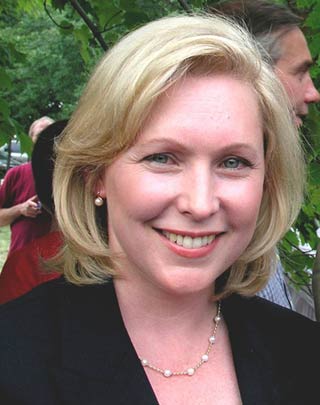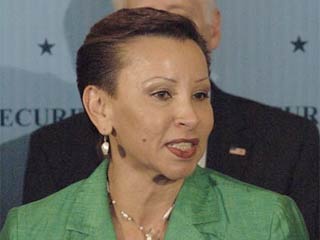The Replacements
by Geoff Kelly
Governor David Paterson has said he won’t name Hillary Clinton’s successor in the US Senate until she’s been confirmed as secretary of state, which is sesnible. However, he has begun to gather a team of consultants to help him consider likely candidates.
Here at AV, we’ve done the same. Below we evaluate a handful of the frontrunners for the position, beginning, alphabetically, with Buffalo’s own…

Mayor Byron W. Brown: Notwithstanding Brown’s downstate origin, this Queens native is now a Western New York politician, and that is a considerable handicap. Brown would have a hard time generating the statewide profile and raising the money required to hold the seat in 2010—not even with the financial support of Tom Golisano, whose Responsible New York committee could not spend money in a federal election so freely as it did in this fall’s state races. (And would Brown be forced to shed his renewed relationship with unsavory Democratic apparatchik and Responsible New York co-chair Steve Pigeon, as he did in order to become mayor in 2005?) A big-name Democrat (like Andrew Cuomo) would dismantle Brown in the 2010 primary. A big-name Republican (like Rudy Giuliani, though he’s making far too much money to want a demotion to senator) or even a small-time Republican (like brand new Congressman Chris Lee, who has deep pockets and is likely to be redistricted out of his seat come the 2010 Census) or a big-name independent (like New York City Mayor Michael Bloomberg) might defeat Brown if he somehow made it as far as the general election.
Being mayor of the nation’s second-poorest city, one of the worst places to be born African American or Latino, is a political albatross on the statewide stage. Brown might not even deliver his hometown. Just last week, the mayor ran a slate of candidates for Democratic Party zone chair positions in the Masten District—literally in his own backyard—and lost to Champ Eve’s candidates. Not exactly confidence-inspiring.
On the other hand, Paterson will listen to the Clintons on this matter, and the Clintons may well listen to Pigeon, who remains close to them, and to Golisano, who is a friend of Bill and a big donor to the Clinton Global Initiative. Also, Brown served with Paterson in the state senate and was a swing vote that helped make Paterson minority leader, though I wouldn’t make too much of that: Brown demanded and received payment for his vote in money for staff positions, so Paterson doesn’t owe him anything.
No, Brown’s name is in the conversation just to be in the conversation—it burnishes his image as a pezzonovante among state Democrats. He’d do well to keep his eyes on the US House of Representatives, with an aim to fill either Brian Higgins’ seat, should he move on, or, more likely, Louise Slaughter’s seat when she retires. (Read on to learn how that might come to pass.) Brown could hold either of those seats as long as he wanted.
Bronx Borough President Adolfo Carrion: Carrion is a dedicated Clintonista who is more likely to land in Hillary Clinton’s state department than in her Senate seat.
Bill Clinton: Just kidding. Anyway, he’s already said he’s not interested.
New York State Attorney General Andrew Cuomo: Now here is a big-name Democrat with a statewide profile who can raise lots of money. Cuomo wants to be governor, so Paterson may send him to the Senate in order to dispose of a rival. But Cuomo, I imagine, would be just as pleased to be senator as governor, for the very reasons Bruce Fisher enumerates in his article.
US Representative Kirsten Gillibrand: This conservative Albany Democrat makes the short list of candidates largely because it’s possible that Clinton will insist her seat be filled by a woman. But she shares the same regional weakness as Byron Brown and virtually every other candidate who hails from outside New York City: No one outside her district has ever heard of her. And, while Albany may seem like downstate to Buffalonians, to New Yorkers it’s not downstate enough. If, however, Paterson is seeking a placeholder—someone to keep the seat warm until the 2010 election and then step aside—Gillibrand would do.
US Representative Brian Higgins: Higgins, like Brown, would have a difficult time holding the seat in 2010. His strong and influential local support simply doesn’t translate across the state. Nonetheless, he has been adding a foreign policy dimension to his skill set with an eye on advancement; consider his trips to Afghanistan, Iraq, and Sudan. He’s wise to do that, because the 2010 redistricting, which will likely reduce Western New York’s Congressional delegation from five to four, may not be kind to him. His district boundaries may be extended outward from the shores of Lake Erie into more rural and Republican regions, rendering the district considerably less safe for a Buffalo-based Democrat.
US Representative Steve Israel: This Long Islander has a strong New York City media profile and he can raise plenty of money for the 2010 race. Problem is, he drinks from the same well as Senator Chuck Schumer. Consider him an also-ran.
A Kennedy: Caroline Kennedy and Robert F. Kennedy, Jr. were both reportedly offered Clinton’s seat, and both reportedly have declined. Robert F. Kennedy, Jr. has said in the past he might run if Hillary Clinton left the Senate. Look for him in 2010.
US Representative Gregory Meeks: The congressman from Queens is a much more logical choice than Brown if Paterson is intent on sending an African American to the Senate.
New York State Governor David Paterson: No way, Bruce. It would be too unseemly. And he’d lose the seat in 2010, if not in the primary election then in the general. I can hear the radio spots now: “David Paterson abandoned his state when it needed him the most. And now he wants six more years in Washington? Tell him no way.”
US Representative Louise Slaughter: Why not? Slaughter is a powerful and senior member of the House of Representatives whose long career is coming to a close. Why not reward her eight years’ relentless badgering of the Bush administration with two years in the US Senate? In 2010, she could step aside and retire from elective office, leaving the seat to be acquired on the merits of the candidates who enter the race—or at least based on their facilities as campaigners and fundraisers.

Slaughter’s appointment would satisfy the Clintons’ desire to do something for Golisano, too, as Byron Brown could easily by shuffled into Slaughter’s current seat in Congress—the very seat he so dearly covets, one that he is capable of retaining. The only fly in that ointment, of course, is the prospect of Sam Hoyt rushing into the mayoral race next year. Brown’s camp won’t like that. (Neither will South District Councilmember Mickey Kearns—not that he has much to say about it.)
New York State Senator Malcolm Smith: His name has been bandied about, but I don’t see it: The state’s fiscal crisis has strained relations between Paterson and Smith, and the governor is not going to send Mr. Smith to Washington as a reward.
US Representative Nydia Velazquez: This congresswoman from the Bronx has been the quiet front-runner for Clinton’s seat since rumors of its impending availability first surfaced. And she certainly has the attributes: a popular Latina legislator from New York City. The received wisdom may be spot on. We don’t know much about her here in Western New York, but the New York City media can change that in just a few months.
—geoff kelly
blog comments powered by Disqus|
Issue Navigation> Issue Index > v7n49: Paterson's Choice (12/4/08) > The Replacements This Week's Issue • Artvoice Daily • Artvoice TV • Events Calendar • Classifieds |









 Current Issue
Current Issue